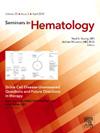CD19 CAR-T 细胞疗法治疗复发或难治性弥漫性大 B 细胞淋巴瘤;为何会失败?
IF 5
3区 医学
Q1 HEMATOLOGY
引用次数: 0
摘要
嵌合抗原受体 T(CAR-T)细胞疗法是治疗复发或难治性弥漫性大 B 细胞淋巴瘤(DLBCL)的有效方法,目前已有三种 CD19 靶向产品获得 FDA 批准用于该适应症。然而,多达60%的患者在接受CAR-T细胞治疗后最终会进展或复发。DLBCL患者对CAR-T细胞疗法产生耐药性的机制可能是多因素的,尚未完全阐明。要确定可预测个体对 CAR-T 细胞疗法反应的患者、肿瘤和治疗相关因素,需要对临床试验数据和该人群的实际经验进行持续分析。在这篇综述中,我们将讨论迄今为止发现的可能导致 CAR-T 细胞疗法无法使 DLBCL 患者获得持久缓解的因素。本文章由计算机程序翻译,如有差异,请以英文原文为准。
CD19 CAR-T cell therapy for relapsed or refractory diffuse large B cell lymphoma: Why does it fail?
Chimeric antigen receptor T (CAR-T) cell therapy is an effective treatment for relapsed or refractory diffuse large B cell lymphoma (DLBCL) with 3 CD19 targeting products now FDA-approved for this indication. However, up to 60% of patients ultimately progress or relapse following CAR-T cell therapy. Mechanisms of resistance to CAR-T cell therapy in patients with DLBCL are likely multifactorial and have yet to be fully elucidated. Determining patient, tumor and therapy-related factors that may predict an individual's response to CAR-T cell therapy requires ongoing analysis of data from clinical trials and real-world experience in this population. In this review we will discuss the factors identified to-date that may contribute to failure of CAR-T cell therapy in achieving durable remissions in patients with DLBCL.
求助全文
通过发布文献求助,成功后即可免费获取论文全文。
去求助
来源期刊

Seminars in hematology
医学-血液学
CiteScore
6.20
自引率
2.80%
发文量
30
审稿时长
35 days
期刊介绍:
Seminars in Hematology aims to present subjects of current importance in clinical hematology, including related areas of oncology, hematopathology, and blood banking. The journal''s unique issue structure allows for a multi-faceted overview of a single topic via a curated selection of review articles, while also offering a variety of articles that present dynamic and front-line material immediately influencing the field. Seminars in Hematology is devoted to making the important and current work accessible, comprehensible, and valuable to the practicing physician, young investigator, clinical practitioners, and internists/paediatricians with strong interests in blood diseases. Seminars in Hematology publishes original research, reviews, short communications and mini- reviews.
 求助内容:
求助内容: 应助结果提醒方式:
应助结果提醒方式:


